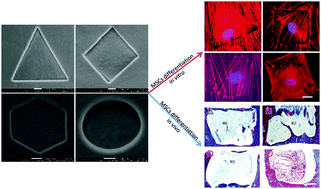Dynamically tunable polymer microwells for directing mesenchymal stem cell differentiation into osteogenesis†
Abstract
Directing stem cells towards a desired location and function by utilizing the structural cues of biomaterials is a promising approach for inducing effective tissue regeneration. Here, we exploited the dynamic structural signals resulting from the micro-well substrates to guide the rat bone marrow mesenchymal stem cells (rBMSCs) to differentiate along osteogenesis. The micro-well substrates were fabricated via thermal lithography with arrays of triangle-, square-, hexagon- or round-shaped micro-wells, which were made of a biocompatible and biodegradable polymer network containing six-arm poly(ethylene glycol)-poly(ε-caprolactone) (6A PEGPCL) with the excellent thermally activated shape memory function. The dynamically tunable geometric microwells and the resulting mechanical force effectively and significantly regulated the cytoskeletal structure and tension of rBMSC in vitro without induction media when compared with the static patterned. Cellular and molecular analyses revealed that cells cultured in various dynamic micro-wells had disparately differentiated along adipogenesis and osteogenesis pathways. We further implanted these dynamically tunable geometric micro-well substrates into the site of the rabbit mandible defect and found that they prompted differentiation of mesenchymal stem cells into osteogenesis and in turn efficiently repaired the mandible bone defect. Taken together, this work points to the role that dynamic geometric shape cues can orchestrate the mechano-chemical signals thus direct MSCs to appropriate fates.


 Please wait while we load your content...
Please wait while we load your content...